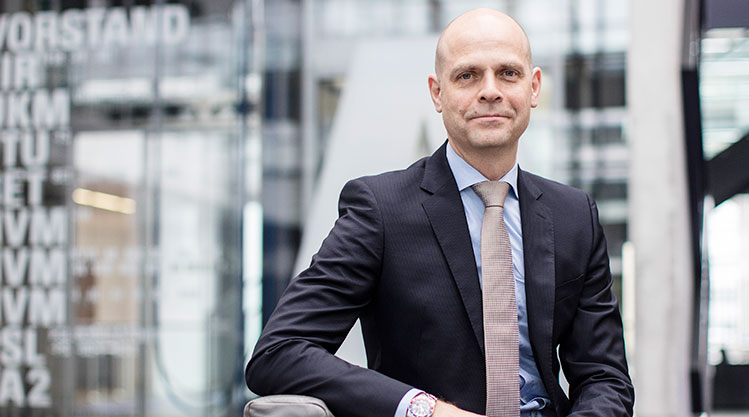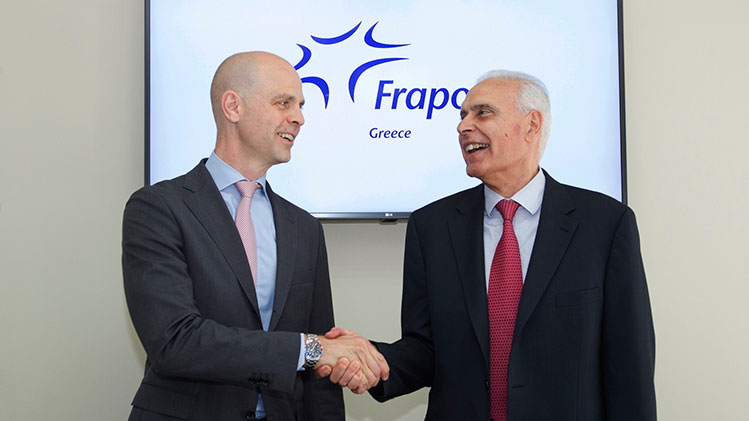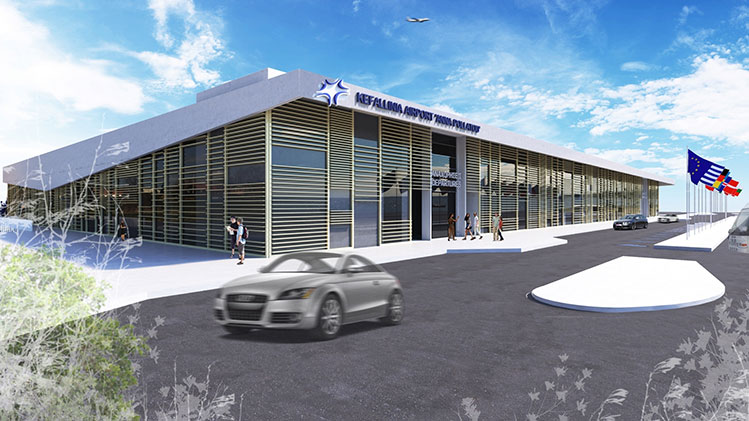In April 2017, Fraport Greece commenced the 40-year concession for managing, operating and developing 14 regional airports on the Greek mainland and popular holiday islands. Alexander Zinell, CEO Fraport Greece, outlines the company’s focus on enhancing facilities, operational processes and passenger experience to Marta Dimitrova.

Alexander Zinell, CEO Fraport Greece: “Our long-term goal is to have sustainable growth and to attract more traffic beyond the traditional high-season months. Our infrastructure investment programme will help make this possible.”
Within just one night, Fraport saw its portfolio jump from 10 to 24 airports, following the concession of the 14 Greek Regional Airport Project in April. Some of the Greek regional airports are small and individually would not have been an interesting asset on their own. However, as a group, the 14 airports, which include Kavala, Thessaloniki, Kerkyra, Skiathos, Mytilene, Aktion, Kefalonia, Zakynthos, Mykonos, Kos, Santorini, Chania, Rhodes and Samos, provide a critical mass for an airport specialist like Fraport.
“This is a significant project for many years,” enthuses Alexander Zinell, CEO Fraport Greece. “It is spread over 40 years and presents good growth potential using our extensive expertise and experience in airport management and development. Planning the transfer of 14 airports at once and creating a brand new airport company to oversee them – in under one year – is an amazing achievement that we are proud of, and which many in the industry applauded.”
Indeed, Fraport Greece has drawn upon the full resources of Fraport AG and implementing this complex project demonstrates the capabilities and strengths of Fraport. Additionally, in 2017 the company won bids for two airports in Brazil and has signed an agreement in Peru for a major expansion of Lima Airport.
€400m investment
Fraport’s strategy is to continue growing its international business worldwide. Greece offers tremendous potential as one of the world’s great travel destinations – especially once the regional airports are enhanced with modern infrastructure and efficient operations managed by Fraport Greece.
As part of its mandate for taking over management and operations at the 14 airports, Fraport Greece has prepared a comprehensive plan for the modernisation and development of the airports. The company’s plan includes immediate projects and development works for upgrading the airports’ facilities, which will contribute significantly to improving the overall customer travel experience, while responding to the expected increase in passenger traffic. Fraport Greece will invest €400 million for development works until 2021. During the 40-year concession period, the company will implement additional maintenance and upgrading works, as well as capacity expansion dependent on traffic growth.
Fraport Greece’s major works include building five new passenger terminals – at the airports in Thessaloniki, Kefalonia, Kerkira, Kos and Mytilene – as well as redesigning the terminals at the other airports. After completion, terminal space at the 14 airports will grow by 100,000sqm, reaching a combined total of 300,000sqm.
Other improvements for increasing the total capacity of the airports and the quality of services include: increasing the number of check-in counters, security check lanes, departure gates and aircraft parking stands.
“An important element of Fraport Greece’s new era for the 14 gateways is to renew and modernise the exterior and interior image of the airports,” Zinell explains. “Indeed, the neat and, in some cases new, architectural designs will offer a modern image at these 14 ‘gateways of Greek tourism’ – thus creating a pleasant travel experience for millions of passengers every year.”
Greece continues to grow its tourism, not only from northern Europe but also from other regions. “Our 14 gateways are vital for meeting the growing tourism demand – now and in the years to come.”
So far in 2017, traffic at the 14 airports has jumped by 10.4% to 19.7 million passengers and Zinell truly believes in the strong potential for continuing passenger traffic growth. “Our long-term goal is to have sustainable growth and to attract more traffic beyond the traditional high-season months. Our infrastructure investment programme will help make this possible.”
In August 2017, Fraport Greece’s 14 airports served a total of 5.1 million passengers, achieving combined traffic growth of 8.3% year-on-year. The busiest of the 14 Greek airports are Rhodes with one million passengers (+2.4%), Thessaloniki with 781,617 passengers (+14.6%) and Kerkyra on the island of Corfu with 628,681 passengers (+2.7%).
Fraport Greece understands that enhancing the airport gateways for international visitors is absolutely essential for the ongoing development and success of the tourism sector, which is a major source of employment, and generating revenue for the individual regions and Greece as a whole. “Even before we commenced operations at the 14 airports, we have been engaged in active and open dialogue with the airport regions and their stakeholders – including key tourism players and other business leaders,” Zinell comments.

Fraport Greece CEO Alexander Zinell and HRADF CEO Antonis Leousis celebrate the €1.23 billion upfront payment to Greece after the successful transfer of the 14 regional airports.
State-of-the-art retail concepts
Fraport Greece’s investment programme will also provide more retailing opportunities with 12,000sqm of shop space.
Earlier this year, the airport signed a 30-year agreement with Dufry through its Hellenic Duty Free Shops subsidiary. “The goal of our joint planning will be to develop retail areas featuring a greater range and number of shops and food & beverage outlets. We want to give Fraport Greece passengers and visitors a completely new shopping and service experience. As we have stressed from the outset, Fraport Greece is committed to enhancing facilities and service quality.”
Once complete, the new retail area at the airports will provide a distinctive sense of place. “By introducing state-of-the-art retail concepts and store design, we will create a strong sense of place and increase the visibility of Greek products,” Zinell notes. “In this way, we will also be helping to promote Greece’s unique culture, culinary specialties and other products – also important for business and the economy – to travellers visiting from around the globe. Of course, we will work closely with the various retail operators to achieve a unique experience for travellers.”

Fraport Greece will invest €400 million for development works until 2021. Major works include building five new passenger terminals – at the airports in Kefalonia, Thessaloniki, Kerkira, Kos and Mytilene – as well as redesigning the terminals at the other airports.
In terms of enhancing the overall passenger experience at the airports, Fraport Greece is already building up the core infrastructure that will support future development of new and innovative technology. For instance, the company has already installed SITA’s CUTE technology for check-in, as well as free WiFi throughout the terminals of all of its airports. This will also help minimise the impact on passengers once the construction plan commences. “A priority is to install state-of-the-art high-speed IT networks for operational and passenger applications in the future,” Zinell adds.
Looking ahead, along with tackling the daily challenges of running an airport system comprising 14 airports at diverse mainland and island locations, Fraport Greece is scheduled to launch its infrastructure development plan in October 2017. “Creating efficient and quality airports that deliver a superb passenger experience is the goal we will be pursuing every day over the next 40 years. Working closely with our airport partners and stakeholders is also an important priority,” Zinell concludes.







